Existing User Log In
New User Registration
Register for a free account to gain full access to the VGChartz Network and join our thriving community.



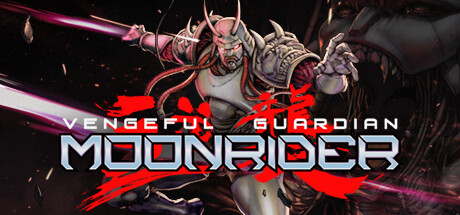

America - Front
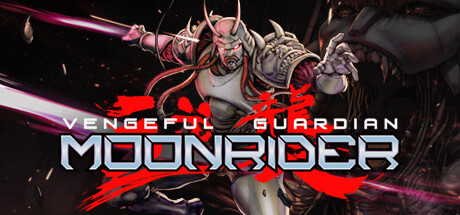

America - Back

JoyMasher
Action
 (Add Date)
(Add Date) (Add Date)
(Add Date) (Add Date)
(Add Date)
| Owners: | 0 |
| Favorite: | 0 |
| Tracked: | 0 |
| Wishlist: | 0 |
| Now Playing: | 0 |
Some people, uncomfortable with their current surroundings, say they were born in the wrong decade. Well, Danilo Dias and Thais Weiller, who co-founded JoyMasher in 2012, started making games in the wrong decade. With a keen eye for the design principals and aesthetic of old-school action games, Dias and Weiller would have fit right in alongside Capcom, Konami, and Tecmo in the late 80s and early 90s. Already they've turned in the Ninja Gaiden-ish Oniken, the Castlevania-esque Odallus, and the excellent Contra clone Blazing Chrome. Their latest is Vengeful Guardian: Moonrider, an action-platformer that would be right at home on Sega Genesis next to titles like Shinobi and Strider.
Moonrider takes place in a futuristic dystopia, where a totalitarian government, reinforced by loyal super soldiers, oppresses the people and clamps down on any uprising with deadly force. One of those super soldiers, a warrior called Moonrider, rejects its programming and decides to take vengeance on the authoritarian state.
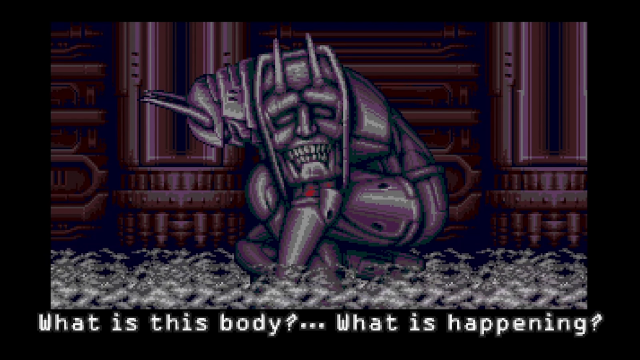
This is a fine premise for a hardcore action game, no doubt. Unfortunately JoyMasher doesn't always deliver the story in a coherent or satisfying way. Moonrider remains a mystery by the end of the game, as do the identities, allegiances, and motivations of most of the characters we meet along the way.
That said, story is absolutely not the point of a throwback action game like Moonrider. The idea is to channel classics like Ninja Gaiden and Shinobi. Judged by that criterion, the game is a success. As the revenge-seeking Moonrider, you'll jump, ride, hack, and slash your way through nine unique stages, dodging obstacles, slicing bad guys, taking down powerful bosses, and in general surviving a deadly gauntlet of non-stop action. Overall, the game just feels right. It's nimble and responsive but also crunchy and forceful.
The controls go a long way to help create that feeling of agility and authority. They're tight, responsive, and precise — just what you'd expect from an old-school homage like this one. When those snappy controls meet Moonrider's violent move set, everything falls into place. The vengeful guardian can slash with a deadly sword, perform a three-hit combo, execute a mid-air kick downward or diagonally, and unleash one of seven different special attacks, which drain mana.
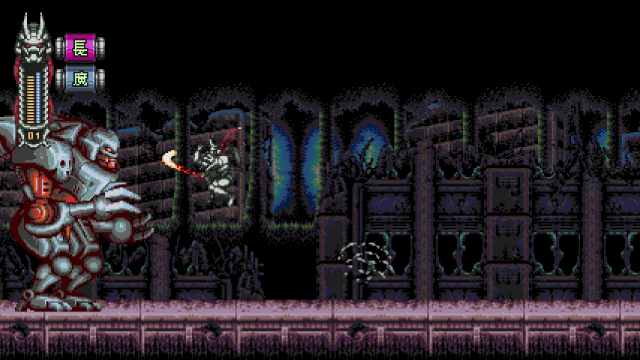
You'll earn those special attacks by toppling the boss lieutenants that guard each of the game's zones, which are accessible in any order. In this way, the game takes on a distinct Mega Man flavor, which serves it well. The zones themselves are quite interesting, both thematically and mechanically. Some are heavy on platforming and wall-jumping; others have unique events like an escape from a fiery inferno; and some flip the script, turning this side-scrolling action-platformer into a vehicular combat racing game à la Mach Rider.
While Moonrider boasts a good amount of mechanical diversity, it doesn't enjoy a long running time. With only nine shortish levels, there's not a lot to sink your teeth into. You could beat the final boss and see the credits roll in approximately two hours. Now, Dias, Weiller, and designer/programmer Andre "Yin" Silva add some elements to encourage repeat playthroughs. Most stages hide one or two Chips, which grant perks like HP regeneration or double jump. Furthermore, the game will grade you after each stage, based on your time and performance. If you want to turn that C into a A, you'll have to keep trying.
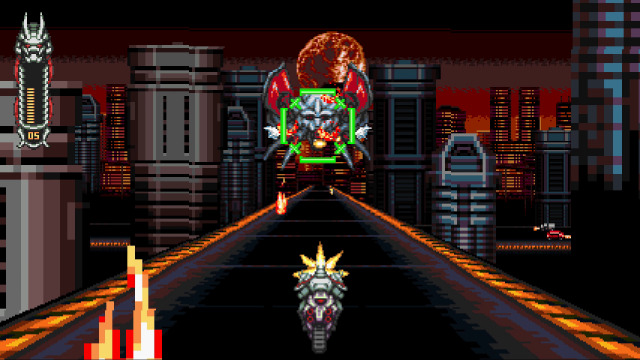
Also adding to the length of the game is its steep level of difficulty. This is an old-school action title through and through, and thus not for the faint of heart. You'll need to move around each level carefully, deploy your special moves strategically, and map out the bosses' attack patterns in order to survive each stage. Luckily, JoyMasher added a safety valve of sorts in the Armor Chip, earned upon your first death. This perk greatly reduces damage received, but limits your stage score to B grade. If you continue to hit a wall, and don't care about high scores, you can equip this to get past the most challenging parts.
For years, JoyMasher has created video game art that's both nostalgic and fascinating; that trend continues with Moonrider. The game's 16-bit pixel graphics, designed by Dias, are perfect for the genre and setting. They tell a story of a ruined world overseen by a totalitarian regime and filled with the machinery of war. Moonrider itself is quite an accomplishment: a chrome super soldier with a samurai mask and Oni-themed pauldrons.
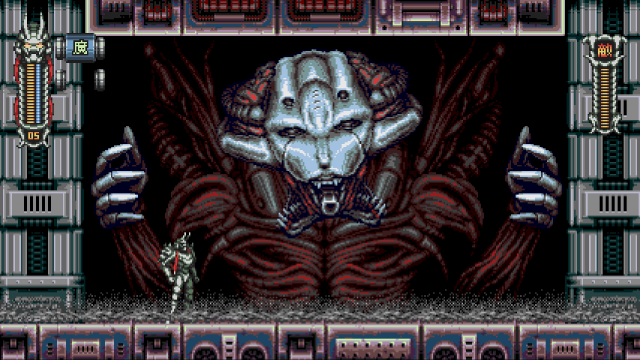
The game's metal soundtrack, written by Dominic Ninmark, is also appropriate, both to the genre and the action-platformers that inspired Moonrider. Filled with vigorous, almost caustic music, it strives for that authentic Genesis soundscape. "Genoqueen" is one of several rocking tunes.
Dias and Weiller, along with Sliva and Ninmark, have once again proved how their unique talents would have made a big impression in the video game landscape of the late 80s and early 90s. Indeed, thanks to its side-scrolling gameplay, steep difficulty, 16-bit pixel graphics, and punchy audio you might mistake Moonrider for a lost Genesis game. Now, not everything is perfect. Moonrider is short and at times incoherent. Yet it's hard to put down. It delivers that crunchy, stylized arcade action that helped make the Genesis generation so memorable.









